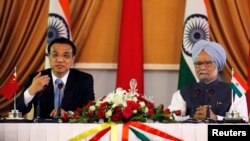NEW DELHI —
The leaders of Asian giants India and China say they will take steps to build greater mutual trust a month after a tense dispute over their shared border.
With words like friendship, peace and consensus, Indian Prime Minister Manmohan Singh and his Chinese counterpart, Li Keqiang, meeting in New Delhi, set out to move past the standoff that dominated headlines just weeks ago.
Last month, India strongly protested what it said was Chinese incursion into the Ladakh region of the Himalayas. The issue was resolved just before the Indian foreign minister’s visit to China, with troops from both countries withdrawing to prior positions.
In remarks to the media following talks with Li, Prime Minister Singh spoke of taking stock of the recent incident.
"The basis for continued growth and expansion of our ties is peace and tranquility on our borders. While seeking an early resolution of the boundary question, Premier Li and I agreed that this must be continued to be preserved," he said.
The border issue is not new and numerous rounds of talks have failed to clearly demarcate the Line of Actual Control in the region that was the site of a brief war between the two countries in 1962.
Chinese Prime Minister Li acknowledged the need to improve various border mechanisms and overcome differences between his country and India. But he placed more emphasis on the global impact of cooperation between two of the world’s emerging superpowers.
He reiterated Prime Minister’s Singh’s statement that "the world is big enough to accommodate the growth aspirations of both China and India.” The Chinese leader added that “without the common development of China and India, Asia will not become strong and the world will not become a better place.”
Boosting trade
During Monday’s talks in New Delhi, both leaders also discussed boosting bilateral trade, which grew to $66 billion in 2012 and is targeted for $100 billion by 2015. Singh also conveyed India’s concerns about the trade deficit and having greater access to Chinese markets.
Chinese and Indian officials also signed eight agreements and discussed cooperation and information sharing on activities taking place on trans-border rivers in the Himalayan ecosystem.
There was tight security in the Indian capital on the second day of Prime Minister Li’s three-day visit to India as Tibetan activists and opposition supporters held small protests in the city.
Prime Minister Li meets with ruling Congress Party leader Sonia Gandhi and the leader of the main opposition Bharatiya Janata Party, Sushma Swaraj, on Monday, before heading to India’s financial hub, Mumbai, on Tuesday to hold talks with business leaders.
From India, the Chinese leader travels to Pakistan and then to Switzerland and Germany.
With words like friendship, peace and consensus, Indian Prime Minister Manmohan Singh and his Chinese counterpart, Li Keqiang, meeting in New Delhi, set out to move past the standoff that dominated headlines just weeks ago.
Last month, India strongly protested what it said was Chinese incursion into the Ladakh region of the Himalayas. The issue was resolved just before the Indian foreign minister’s visit to China, with troops from both countries withdrawing to prior positions.
In remarks to the media following talks with Li, Prime Minister Singh spoke of taking stock of the recent incident.
"The basis for continued growth and expansion of our ties is peace and tranquility on our borders. While seeking an early resolution of the boundary question, Premier Li and I agreed that this must be continued to be preserved," he said.
The border issue is not new and numerous rounds of talks have failed to clearly demarcate the Line of Actual Control in the region that was the site of a brief war between the two countries in 1962.
Chinese Prime Minister Li acknowledged the need to improve various border mechanisms and overcome differences between his country and India. But he placed more emphasis on the global impact of cooperation between two of the world’s emerging superpowers.
He reiterated Prime Minister’s Singh’s statement that "the world is big enough to accommodate the growth aspirations of both China and India.” The Chinese leader added that “without the common development of China and India, Asia will not become strong and the world will not become a better place.”
Boosting trade
During Monday’s talks in New Delhi, both leaders also discussed boosting bilateral trade, which grew to $66 billion in 2012 and is targeted for $100 billion by 2015. Singh also conveyed India’s concerns about the trade deficit and having greater access to Chinese markets.
Chinese and Indian officials also signed eight agreements and discussed cooperation and information sharing on activities taking place on trans-border rivers in the Himalayan ecosystem.
There was tight security in the Indian capital on the second day of Prime Minister Li’s three-day visit to India as Tibetan activists and opposition supporters held small protests in the city.
Prime Minister Li meets with ruling Congress Party leader Sonia Gandhi and the leader of the main opposition Bharatiya Janata Party, Sushma Swaraj, on Monday, before heading to India’s financial hub, Mumbai, on Tuesday to hold talks with business leaders.
From India, the Chinese leader travels to Pakistan and then to Switzerland and Germany.





